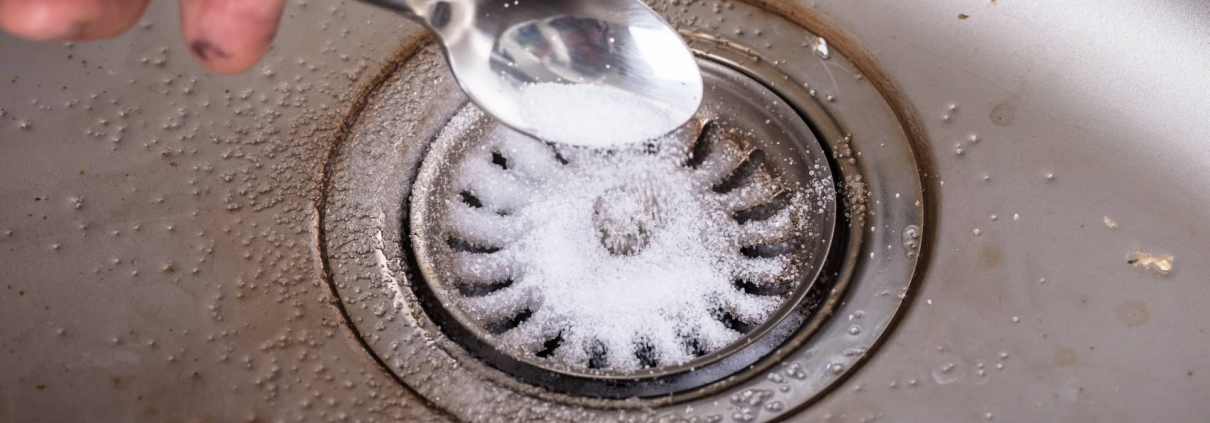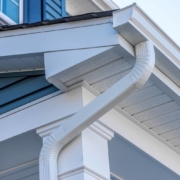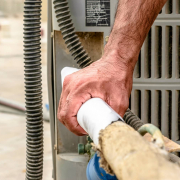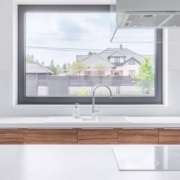Why Should I Put Salt Down My Sink Drain
No one likes to clean their dishes and notice that their sink is clogged. Oftentimes we discard every food leftover on our plates into a garbage disposal. As the food collects inside the garbage disposal, grime and grease can build up from the fats in your foods. Food and fat buildup on the walls of your pipes and garbage disposal create a clog. Every food item should not be discarded into your garbage disposal. You should also consider that maintenance on your garbage disposal is a necessity. Why should I put salt down my sink drain? Salt alone is not the solution. A mixture of salt, baking soda, vinegar, and hot water is key.
Let’s take a look below at what we should not pour down our sinks drain and what we can do to prevent or open up a clogged sink drain.
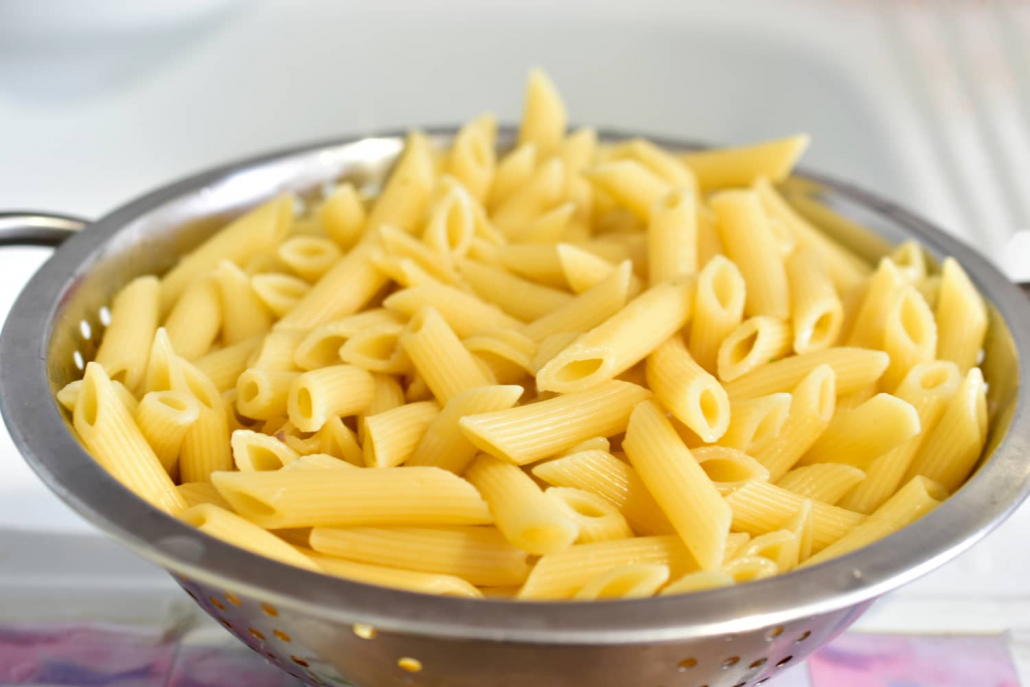
What Causes My Drain Clog
There are a lot of items that can be poured into a sink and cause your drain to clog. Being smart and diligent about what is going into your sink drains is key. The majority of excess food should be scrapped off your plate and put into a trash bag. Foods do not always break down so quickly and can lead to buildup or even pests such as gnats and flies in our sink. Here is the top list of items to never pour down a sink drain, regardless of garbage disposal.
- Grease – grease is fat that when solidifies becomes very thick and almost impossible to move through your pipes. The result is a rapid buildup in your pipes as the grease cools down. Your sink drain will become clogged almost immediately after the grease has cooled and solidified. Pour grease into empty coffee cans or jars that you might have laying around for this purpose only.
- Food that expands – when water is added, oats, rice, pasta can all expand. This allows these foods to puff up and create blockages in your pipes. Discard all excess starchy foods into your garbage can.
- Paper products – never discard paper towels, wipes, or other sanitary products down the drain. They will adhere to the walls of your plumbing pipes and not make it out to the sewer system.
- Coffee grinds – coffee grinds are very harsh to the pipes and not properly ground by garbage disposals. This can lead to common sink backups.
- Eggshells – although they seem to be easily ground up as fragile as eggshells are, that does not mean they won’t collect and get stuck in viscous parts of other foods that do not otherwise drain easily. They pretty much provide a barrier when collected in other foods and built-up on the sidewalls of your pipes.
- Flour – one of the last foods you will ever want to get in your sink is flour. Flour expands when water is added and this could lock up your drain fairly easily.
- Medicines – flushing medicines down the sink drain is a huge no no. This can contaminate your water supply. Medicines can also clog your drains.
Many other household and food products can clog and harm your pipes. When in doubt, think about how a product will react to small spaces and water before putting it down a drain.
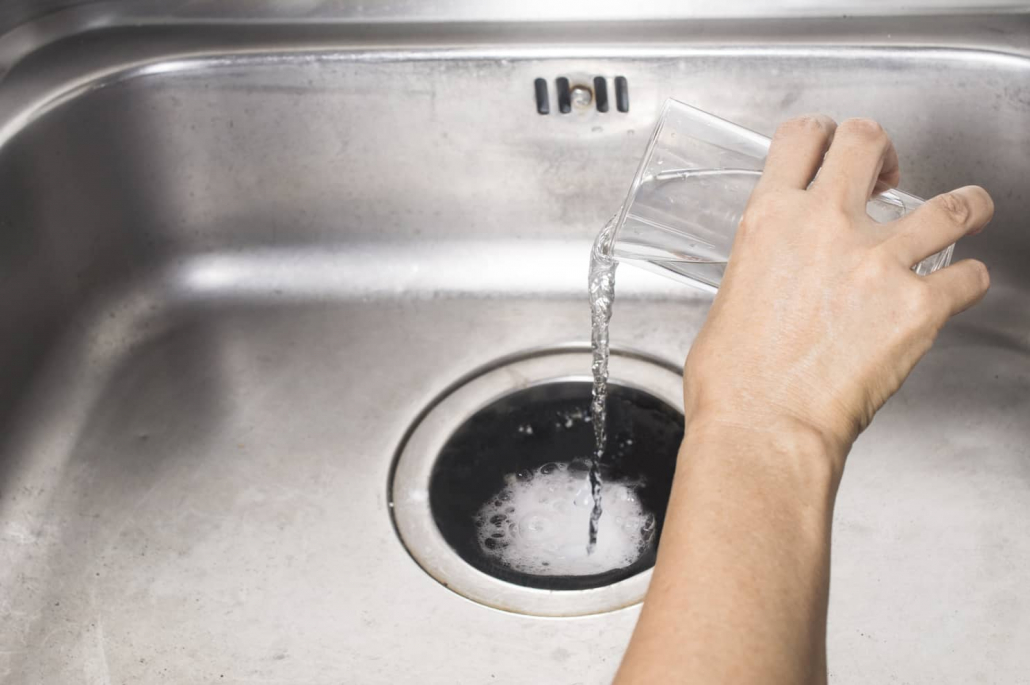
How Can I Prevent A Clogged Sink Drain
Why should I put salt down my sink drain? If you ever want to get ahead with your cleaning. You should complete these steps before going to bed. It is amazing how your initial setup can work overnight while you sleep. Doing this before bed, allows the solution to work overnight and complete the task of pipe and clog cleaning.
- Pour the salt down the drain of the kitchen sink and then the baking powder down the drain of the kitchen sink.
- Add your vinegar to the mixture of salt and baking powder and allow it to foam for about a minute and leave overnight.
- Rinse all of the mixtures down the drain with at least 3 quarters of a gallon of boiling water. (Do NOT use boiling water if you have porcelain sinks or if your plumbing is predominately PVC pipe).
- Alternative to pouring boiling water is simply “HOT” water from the faucet the following morning, to rinse your mixture down the sink drain. Pour the hot water down the drain.
- You are looking at pouring a half cup of salt, half cup of baking soda, and a half cup of vinegar down the sink drains at night. Then add a pint and a half of boiling to hot water.
By doing this the salt can begin to flow through the pipes and break down all grease. Salt can emulsify fats, which allows the vinegar and hot water to then flush all of the broken down grease fats through the pipes more easily.
What Else Can I Pour Down My Sink
Other household items that I could pour down my sink drain to keep it from clogging or just to discard are as follows:
- Coke – has phosphoric acid, which is great at eating away various types of grease and items that could clog up your drains.
- Ammonia – safe to pour down the sink. Should be heavily diluted with hot water. Can act as a pipe cleaner and kill bacteria growth.
- Alcohol – safe to pour down the sink in small quantities.
- Milk – sour milk is ok to pour down the drain, however, limit the amount of milk you are pouring down the drain as it is not environmentally friendly to do so.
- Drain cleaners – there are a variety of chemical drain cleaners that you can purchase to unclog your drains.
Other Recommended Maintenance
Just remember that there are many home remedies such as why should I put salt down my sink drain, suggested for unclogging pipes. Fortunately for the homeowner, these options are very easily attainable and easy to use. Keeping things environmentally friendly when it comes to your pipes should be the most important consideration here. So, using items like salt, baking soda, vinegar, water, and other items is important to consider.
Also, the sink is not the only drain that gets clogged. Most sinks that get clogged are due to the garbage disposal. Research your options for unclogging your garbage disposal, just as you did your sink drain.
Next, consider that calcium buildup on your faucets can create a problem in your pipes. It is a great idea to understand what household chemicals can help you clean this calcium buildup from your faucets.
Lastly, keep in mind that not all clogs are due to food and grease buildup. In some instances, you could have a much bigger issue brewing in your pipes. Remember that your plumbing extends from your home to underneath the home and out to the street. This exposes your pipes to underground roots from trees and shrubbery in and around your yard. In some cases, tree roots can penetrate your pipes and cause major backups.
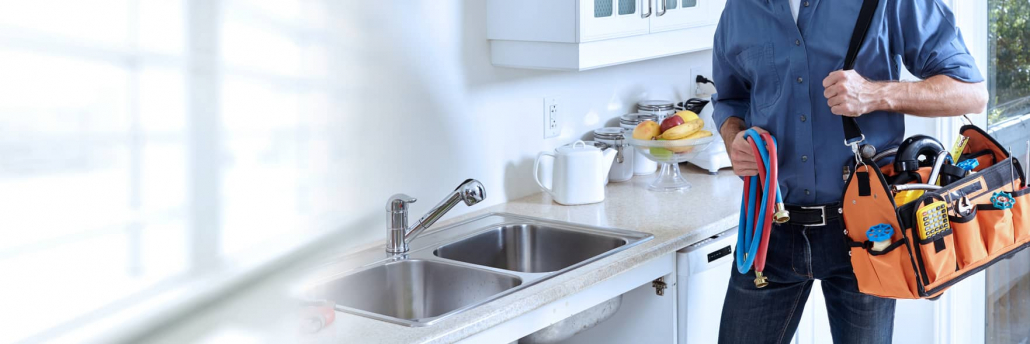
When Do I Call A Professional
Dealing with plumbing is not always easy. Just because ads or promotions recommend some household remedies such as why should I put salt down my sink drain, does not always mean that they are effective. It is important to consult a professional licensed master plumber to inspect your plumbing. This allows you to see if there are greater issues in your plumbing and not just a simple drain clog. The master plumber can run their drain snake through your pipes for instant success in removing any clogs.
Conclusion
Calling on your local plumbing service and home inspection company allows you to find a solution to your clogged water lines. Adding household chemicals such as salt, baking soda, vinegar might seem easy to do. However, it might not be the solution. Call on your local professionals. Your home inspection team can recommend a quality plumbing service company to come out and unclog the water lines as needed. Call on Heartland Inspections services in greater Minneapolis St. Paul and surrounding areas for your plumbing needs and home inspections.

